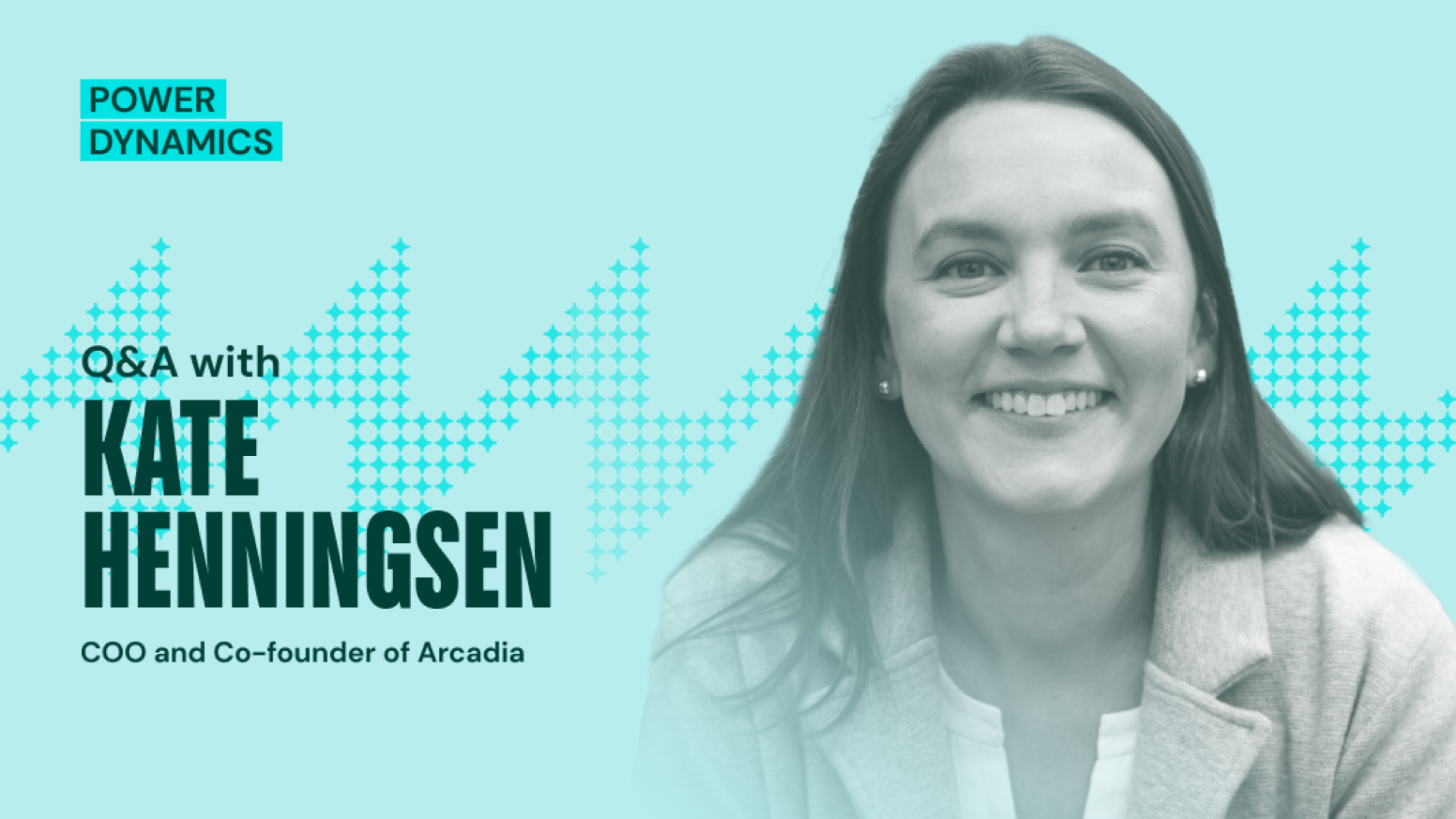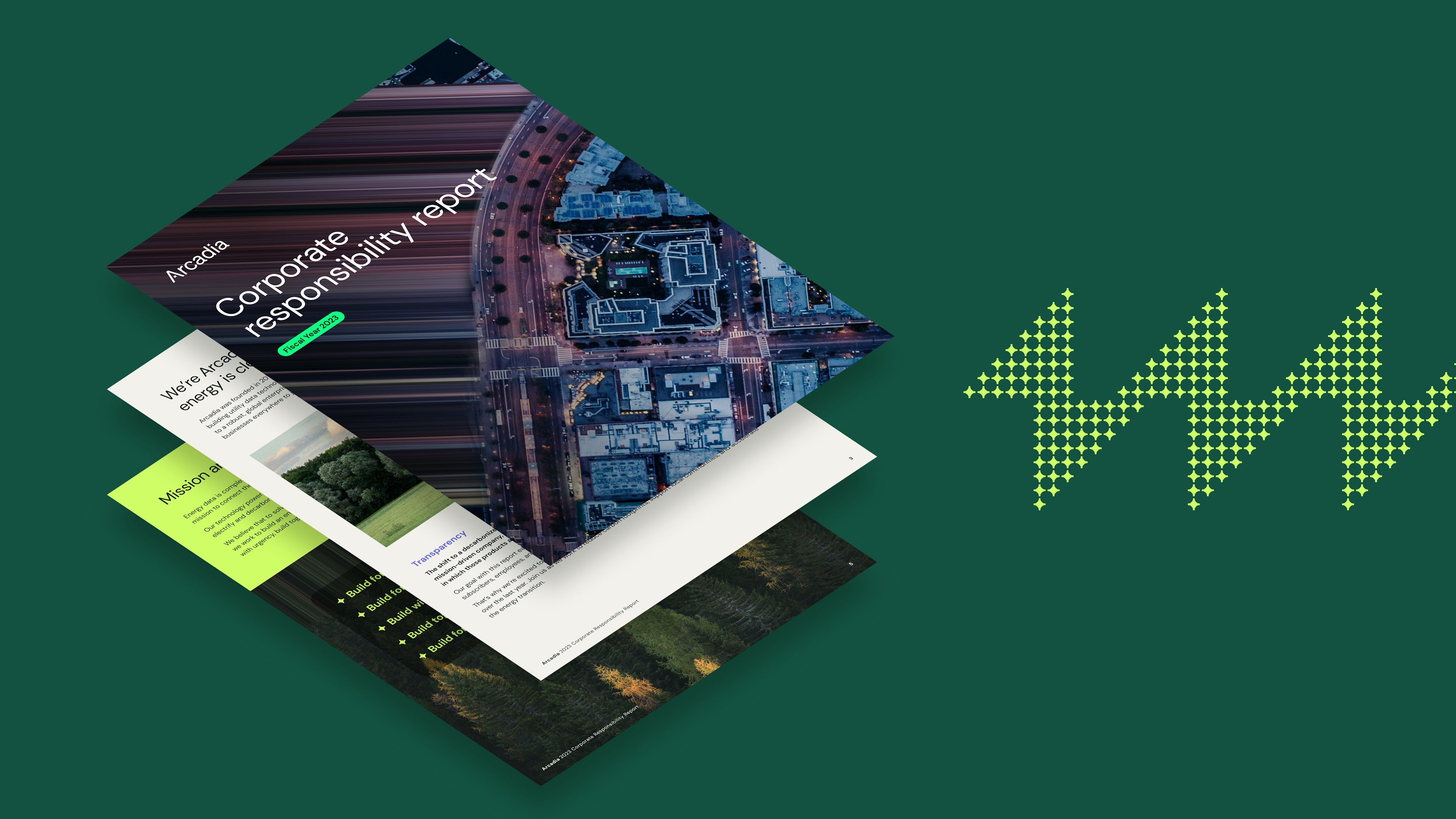How to be a woman killing it in climate tech: Q&A with Arcadia co-founder Kate Henningsen

The story of how Kate Henningsen came to Arcadia is something of a company legend. A proud Midwesterner, Kate followed her love of politics to Washington, DC and became a corporate attorney. But the search for something more impactful — and a cold email to the CEO — led her to Arcadia seven years ago.
There’s a rich lesson in my journey that everyone has a talent they can bring to the table and you should lean into that rather than seeing what you don’t have.
Now as co-founder and chief operating officer, Kate has helped Arcadia grow from a start-up that sold renewable energy certificates to a $1.5 billion climate tech company that empowers any business in the world to make an impact. She’s seen the company grow to more than 700 employees, launch new business lines, and expand globally.
Throughout it all, Kate has been a champion for women in the industry. Recently, she was kind enough to share insights about her career journey and her advice for closing the gender gap in climate tech.
Our conversation has been edited for clarity and length.
Arcadia: How did you come to climate tech?
Kate Henningsen: I was a corporate attorney doing big company litigation. After having our first child, I felt very compelled to use my energy and passion to create something that left the world a better place for her. I thought if I want to create something I should find a start-up and that, as an attorney, I might have some success going into one regulated by a lot of laws — so, healthcare or energy. I got out the internet search and cold emailed about ten healthcare and energy start-ups, all doing good, all making an impact, and explained how I thought a lawyer could really advance what they were doing. Kiran [Bhatraju, Arcadia’s CEO] took the bait and said, “What do you have?” I wrote him a memo on some strategic legal issues I saw in the business and how I thought that law and a lawyer at an early-stage energy start-up could really make an impact on growing the business faster and better.
Creating new business models in a regulated space was a lot of what I spent my time on the first couple years at Arcadia, and I’m happy to report that we still use some of the legal principles I outlined in that memo to run our business today. There’s a rich lesson in my journey that everyone has a talent they can bring to the table and you should lean into that rather than seeing what you don’t have. I had never worked in business, never worked in energy, but I saw the tool I brought to the table — law — and made that my wedge.
What have been some of the highlights of your time at Arcadia?
To be able to hire and work with such amazing people is very humbling and probably my number one highlight. I can’t express what it means to start something that other interesting, qualified, committed folks want to take part in. It is so inspiring for me on a daily basis to look around a (virtual) table and be like, “Wow, you smart people are working with us? This is great! We can do anything!”
Launching Arc, Arcadia’s foundational software platform, was really a big moment as well, because then it went from “What can Arcadia do as one company?” to “What can Arcadia also enable others to do?” That is just such a different mind shift — I’m going to come to work every day to empower other people to fix this climate problem along with us. That’s optimistic to me in a deep way, in a personal way. It doesn’t just matter what Arcadia picks to do that year, that quarter; if we build really good, easy-to-use, value-adding software, we can enable hundreds of people to make hundreds of new solutions to help fix the climate. And that makes me really proud.
And then Urjanet is just a huge moment.
What has helped me most is maintaining my curiosity, leaning into my strengths, and raising my hand and saying yes even if I didn’t know something.
Arcadia is a little bit of an anomaly in terms of the gender diversity of our workforce. We are far above the industry average in terms of female software engineers, in terms of women in the energy industry in general. How does it feel to see those numbers?
I am so proud of that. And what I love about that is that Kiran and I didn’t sit in a room and say, “Oh, we have to increase gender diversity.” If you have diversity at a founder level and a culture that recognizes the value of all voices, I do believe it creates diversity naturally and everywhere. But as we enter the next stage of our company as a 700+-person global team, we know that we can’t take that diversity for granted. We need to tend and cultivate it in a way we maybe didn’t need to in the earlier years. So, now we’re starting to measure it and make sure that we keep those averages high, that we have equal representation in the management and executive ranks, and I’m 100% committed to that. But I love that we haven’t had to for seven years, because when you have diversity in founders, you have diversity in staff.
You talked with Laura Witt recently about how climate change around the world affects women more than it affects men, but women are more frequently not included at the table to talk about solutions. Why do you think it is important to make sure women are at those tables?
I follow the Ruth Bader Ginsburg theory, which is, “When are there enough women Supreme Court Justices? When there are nine.” So to me, it is “When are there enough women at the table? When it’s full of women.” I think that women should be in every conversation. Not only because we are half of the population, but because we have perspectives that have not been there.
What would you like to see change in the industry to narrow the gender gap in the workforce?
Five years ago, when every lawyer I knew was asking, “Hey, how can we get into start-ups like you did?” I would have to tell them that renewable energy is construction and finance. It’s putting poles in the ground and building. That was really dispiriting for a lot of people five years ago. If you think about energy that way — that energy is construction plus finance — you have a lot of male-dominated sectors right there. What I love now is that people are seeing that there’s climate innovation and there are innovative business models in tons of different things. You’re seeing carbon accounting, you’re seeing EVs, you’re seeing analytics firms. There’s just been this explosion of new ways to start to attack this problem. I think that is exciting, because it opens up the fact that everybody has something to give to this climate fight.
And so my hope is that that type of mentality continues. The table should look like the global table because every single person can be working on this problem, can be contributing to the solutions.
What resources have you found helpful in your career navigating this energy space?
There’s not a silver bullet, but what has helped me most is maintaining my curiosity, leaning into my strengths, and raising my hand and saying yes even if I didn’t know something. That’s how I found myself here, running a $1.5 billion company.
I get that question a lot, though — “How did you do this?” Curiosity is so key. In the early days, I tried to soak up any and all things energy to learn the sector, so I went to a lot of energy conferences, subscribed to newsletters, learned what bloggers and podcasters to follow. Now, as we scale, I’m dabbling in business and management books more than I’d like to admit and talking to other operators and COOs as much as I can to hear their lessons and what they’d do over.
How do you get through those moments when impostor syndrome hits?
I have them. I feel them. But ultimately I’ve decided to prioritize growth over self-doubt. So, you sometimes just have to show up anyway. If you desire change and growth, you may feel behind or not prepared because you’re always striving a little bit higher than you were yesterday. Just allow yourself to be comfortable with that feeling and say, “I’m going to prioritize growth over feelings of safety. And that means there are going to be some moments I don’t feel qualified, but I’m still going to be there. And I’m going to be curious enough when I get to those seats to figure out what I don’t know and prepare myself to excel.”
I also fundamentally believe that innovation happens precisely because people leave the beaten path. There’s no manual for the future. So if you want to innovate, you have to be okay saying, “I’m going to trust the way I see or want to do things, even if others would do things differently.”
The table should look like the global table because every single person can be working on this problem, can be contributing to the solutions.
Any other advice that you would give to women looking to break into the climate tech industry?
Reach out to folks. As you can tell, I’m a big cold emailer. I’m a big cold LinkedIn reach-outer. It’s okay to cold reach out to people to try to find a mentor. And you will hear crickets or “no” 90% of the time, but 10% of the time, you’ll have a wonderful conversation with somebody who can change the trajectory of how you think about things. That’s a gift. And, of course, it’s on you to pay that gift back when you’re settled in your career.
How has being a mom changed how you approach your work?
Oh, it changes everything. It’s certainly the reason I’m so passionate — I feel a real drive to make an impact because I want my kids to have a better world. It’s definitely made me a better manager because it creates so much patience and empathy. I read a parenting book once that said something like “When your children are acting out, that’s when they need you to love them with empathy and engagement (rather than get angry) because they are having the hardest time dealing with the world.” I take that kernel into management situations all the time — when people are having a hard time, they need more of my support rather than castigation to help them navigate a challenging situation. So patience, empathy, really listening to hear someone when they are talking are all things I learned as a parent that have also changed my approach to work.

Work on climate solutions with us — we're hiring!
See open positions

